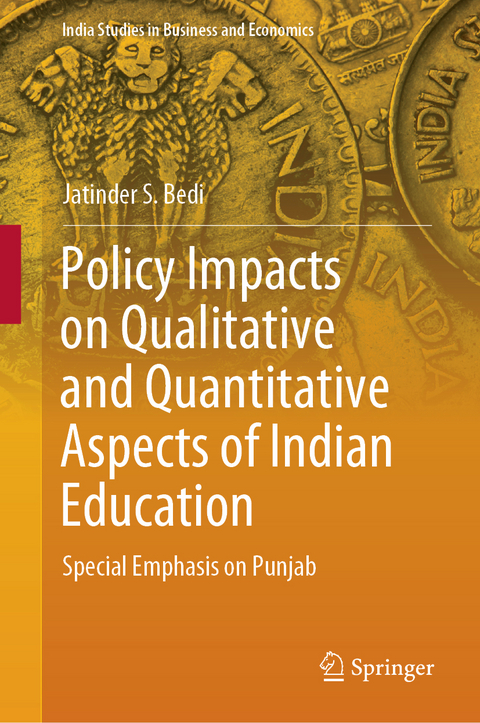
Policy Impacts on Qualitative and Quantitative Aspects of Indian Education
Springer Verlag, Singapore
978-981-13-1491-9 (ISBN)
The book comes up with findings that have deep significance so far as policy making is concerned towards improving the state ofeducation in India. There are fourteen hypotheses that the book proposes based on the study and each hypothesis is accompanied with policy suggestions. Interestingly, one of the hypotheses is that arbitrariness of government policies creates more problems and, as such, before proposing a policy change the government needs to put in more effort and time in planning and come up with carefully chalked out processes. In addition to being a valuable resource for researchers working in this area, the book has huge policy implications and think tanks working towards improving education in India.
Prof Jatinder S. Bedi is the Director of Research at the Institute for Development and Communication (IDC), Chandigarh. Apart from handling research projects at the institute, he teaches and supervises doctoral students in economics and is co-ordinator of Ph.D. Programs in Social Science at IDC, which is an approved Research Centre of Panjab University, Chandigarh. Prior to joining IDC, he worked as a fellow at the National Council of Applied Economic Research (NCAER), New Delhi and also had an administrative role as Head of Operations and Secretary to the NCAER governing body for several years. He has a total of 28 years’ experience in the area of research, teaching and administration and has served various government, semi-government and autonomous organizations and in the corporate sector. He was a member of several important committees such as the Expert Group of the Ministry of Consumer Affairs, Food and Public Distribution, the Ministry of Food Processing Industry Support Group for the Inter-Ministry Task Group on Mid-Term Appraisal for the Tenth Plan, Planning Commission. Apart from his work on education, he has worked in several other diverse areas such as Indian economy, manufacturing sector, micro, small, medium and large scale sector, land economics and GST and have publication in several sector specific sectors such as textiles, food processing, biodiesel and alcohol.
Chapter 1: Introduction and Outlines for the Study.- Chapter 2: Education Related Policies and Review of Literature.- Chapter 3: Evolution of Indian Education with special reference to Punjab.- Chapter 4: Reworking the Estimates of Enrollment and Literacy and Other Indicators of Performance of Education in Punjab.- Chapter 5: Education in Punjab among Various Socio-Economic Groups: Analysis mainly based on SLAS, 2015 Punjab Survey for 5th Class.
| Erscheinungsdatum | 07.11.2018 |
|---|---|
| Reihe/Serie | India Studies in Business and Economics |
| Zusatzinfo | 34 Illustrations, color; 2 Illustrations, black and white; XXXIII, 252 p. 36 illus., 34 illus. in color. |
| Verlagsort | Singapore |
| Sprache | englisch |
| Maße | 155 x 235 mm |
| Themenwelt | Geisteswissenschaften ► Sprach- / Literaturwissenschaft ► Sprachwissenschaft |
| Sozialwissenschaften ► Pädagogik ► Bildungstheorie | |
| Sozialwissenschaften ► Soziologie ► Empirische Sozialforschung | |
| ISBN-10 | 981-13-1491-8 / 9811314918 |
| ISBN-13 | 978-981-13-1491-9 / 9789811314919 |
| Zustand | Neuware |
| Haben Sie eine Frage zum Produkt? |
aus dem Bereich


